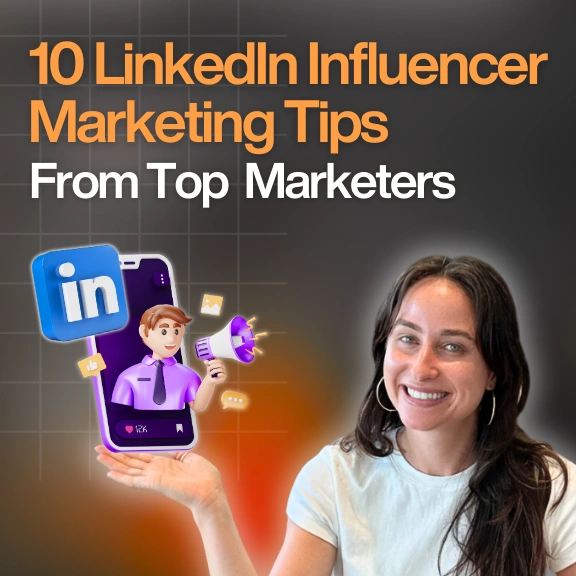Encuentra
Haz los movimientos correctos para encontrar a los mejores creadores para tu marca
Participar
Lleve a cabo campañas, gestione a los creadores y realice un seguimiento de los resultados relacionados con usted
Blog y artículos
Su recurso definitivo para la economía de los creadores
Metodología y clasificaciones
Acerca de Favikon, clasificaciones, herramientas y mucho más.
Perspectivas
La receta detrás de las codiciadas y virales clasificaciones de Favikon.
Herramientas gratuitas para impulsar tus flujos de trabajo de marketing con influencers.
Consulta las historias de éxito de los usuarios de Favikon.
Accede a todas las clasificaciones de Favikon.
Conviértase en socio
Conviértase en afiliado
Acerca del equipo detrás de Favikon
El lugar para hablar economía de creadores, juntos


Clasificaciones destacadas

Here is the Top 50 Rising Video Creators on LinkedIn. Video is quickly becoming the platform’s most powerful format, with creators gaining more reach and engagement than ever. As Gen Z grows its presence and tools like BrandLink and Thought Leader Ads support content creation, LinkedIn is doubling down on video. This ranking, made in partnership with OpusClip, celebrates the creators leading this shift and aims to inspire anyone ready to start sharing through video.

Here is the Top 50 Rising Video Creators on LinkedIn. Video is quickly becoming the platform’s most powerful format, with creators gaining more reach and engagement than ever. As Gen Z grows its presence and tools like BrandLink and Thought Leader Ads support content creation, LinkedIn is doubling down on video. This ranking, made in partnership with OpusClip, celebrates the creators leading this shift and aims to inspire anyone ready to start sharing through video.
El auge del marketing de influencers en LinkedIn
In recent years, LinkedIn has evolved from a platform for job hunting and networking into a robust ecosystem for influencer marketing, particularly within the B2B space. The rise of LinkedIn influencers signals a significant shift in how businesses interact with decision-makers, professionals, and other stakeholders.



Jérémy Boissinot es el fundador de Favikon, una plataforma basada en inteligencia artificial que ayuda a las marcas a obtener información más clara sobre los creadores a través de las clasificaciones. Con la misión de destacar a los creadores de calidad, Jérémy ha creado una comunidad global de creadores satisfechos y ha logrado hitos impresionantes, como más de 10 millones de impresiones estimadas, más de 20 000 nuevos registros y 150 000 clasificaciones en tiempo real en más de 600 nichos. Es alumno de la Escuela de Negocios ESCP y ha estado vinculado a prestigiosas organizaciones como el Ministerio de Francia y las Naciones Unidas en sus actividades profesionales.
Check Brand Deals
The Growing Influence of LinkedIn Creators
LinkedIn has seen a massive rise in content creation and influencer activity. The platform’s algorithm now rewards thought leadership and expert-driven content, which naturally draws in B2B influencers who focus on quality over quantity. Unlike Instagram or TikTok, where viral content dominates, LinkedIn’s algorithm prioritizes authority, relevance, and practical insights—making it the perfect environment for B2B influencer marketing.
Over 1 billion LinkedIn users engage with content that speaks directly to business challenges, professional development, and industry trends. Content creation on LinkedIn has seen a 24% year-on-year increase, driven by the platform’s commitment to supporting creators. With features like live-streaming, newsletters, and new ad formats, LinkedIn has become the go-to platform for influencers looking to engage with business professionals.

For example, brands like Hootsuite and Intel have successfully collaborated with LinkedIn influencers to create authentic campaigns that resonate with decision-makers. This form of influencer marketing focuses on trust, authenticity, and expertise rather than flashy promotions, aligning with LinkedIn’s core professional audience.

The Impact of LinkedIn’s Algorithm on B2B Influencer Marketing
The prioritization of authority content
Successful B2B creators have mastered personal storytelling and sharing expert insights—two things AI or a "regular user" just can’t do well.This is why LinkedIn isn’t positioning itself as a “content creation” platform anymore. They don’t “hate” creators by turning down creator mode or limiting creator tools. They see where the industry is heading and are staying ahead of the curve.That’s why B2B influencer marketing works so well—true influencers are rare, and that scarcity makes them incredibly effective.LinkedIn knows the word “creator” is becoming too broad, and they’re shifting focus to something more meaningful, aka thought leaders.In the crowded world of content creation, here’s how LinkedIn sees itself:
- YouTube, Instagram, X, TikTok: everyday content creators (the plèbe)
- LinkedIn: where the real, valuable creators are—and they’re called thought leaders (the élite)
It’s also an excellent way to attract top-tier influencers—CEOs, athletes, and other high-profile figures—who have been flocking to the platform in droves recently. The Nike CEO or top football players don’t want to be called “creators.” Thought leaders? Now that’s more like it!

This prioritization of authority content is particularly effective for influencers sharing insights on niche topics like SaaS, finance, or leadership. Instead of broad, viral content, LinkedIn influencers often create long-form posts, articles, and even videos to share expertise that solves real-world business problems. This focus on actionable, educational content makes LinkedIn a powerful platform for engaging with B2B audiences.
New Tools to enhance influencer marketing
Moreover, the platform has developed new tools to enhance influencer capabilities. Thought Leader Ads are a new ad format introduced by LinkedIn, allowing brands to promote content directly from the personal profiles of their executives or employees, rather than just the company page. This format emphasizes human connection and authenticity by putting real voices at the forefront, making it more impactful for B2B campaigns. It enables brands to showcase their thought leaders, increasing the reach of insightful, authority-driven content that resonates with LinkedIn’s professional audience.

These ads are designed to foster trust and deeper engagement with target audiences. Thought Leader Ads provide influencers with more ways to build authority while giving brands an opportunity to collaborate on high-quality content that drives business outcomes.

B2B Influencers as Thought Leaders and Trusted Voices
Who are LinkedIn Influencers?

B2B influencers on LinkedIn are not your typical social media celebrities. They are professionals, industry experts, and thought leaders with deep expertise in specific fields. Their influence stems not from the number of followers they have but from their ability to offer market insights, business knowledge, and solutions to complex industry challenges.
For instance, influencers like Justin Welsh have built large, engaged audiences by consistently sharing insights into building businesses and personal brands. Welsh’s approach, focusing on practical, no-fluff advice, has resonated with entrepreneurs and professionals looking to grow their ventures. Similarly, LinkedIn influencers in finance, tech, and leadership fields act as trusted voices for their industries, providing valuable perspectives that traditional advertising cannot match.
B2B Influencers: Trusted Voices for Brands
The trust that B2B influencers build with their audience is priceless. When these influencers recommend a product or service, it carries a weight that is often unmatched by traditional marketing channels. For businesses, working with LinkedIn influencers allows them to reach key decision-makers like CEOs, CTOs, and purchasing managers in a way that feels authentic and trustworthy.

For example, when Ruben Hassid, a top AI influencer, endorses AI products, it’s not just a simple recommendation—it reflects his trust and expertise. As a respected figure in the AI community, Ruben’s reputation is built on delivering high-quality insights and advice. So, when he aligns his name with a particular AI product, he’s not just promoting it—he’s vouching for its value, effectiveness, and reliability. This places his credibility at stake, ensuring that the product meets the standards expected by his audience, which enhances trust and authenticity in the endorsement.
The ROI of LinkedIn Influencer Marketing
The perfect ROI
While influencer collaborations often require a financial investment, the return on investment (ROI) from LinkedIn influencer marketing can be substantial. By working with thought leaders who engage with a targeted audience of decision-makers, businesses can significantly elevate their brand visibility and generate qualified leads. Multiple studies back up the effectiveness of LinkedIn influencer marketing.
For instance, a study from LinkedIn found that 82% of B2B buyers are more likely to trust a company when its leadership team is active on social media. Moreover, influencers who are experts in their field can generate up to 16x higher engagement rates than paid media ads, according to LinkedIn Marketing Solutions. These stats suggest that influencer collaborations on LinkedIn can yield strong ROI by boosting trust, visibility, and lead generation.
A large set of partnerships

Unlike other platforms where influencer marketing may focus more on aesthetics and entertainment, LinkedIn influencers provide measurable business outcomes. The partnerships with influencers often result in more than just brand awareness—they lead to direct engagements, increased credibility, and conversions. Whether through webinars, thought leadership pieces, or case studies, LinkedIn influencers help bridge the gap between businesses and their professional audiences.
For example, a tech company looking to target CFOs or financial managers can partner with a finance influencer who creates educational content around financial strategies. This influencer can authentically introduce the brand’s services while positioning it as a solution to their audience’s pain points. The result is an organic relationship that can lead to higher conversions.
Find out more about the partnership possibilities in this dedicated article.
The rise of LinkedIn influencer marketing highlights the platform’s growing importance in the B2B world. As companies increasingly recognize the value of partnering with influencers who are experts in their fields, LinkedIn’s role as a professional content hub is only going to expand. For brands looking to build trust, engage directly with decision-makers, and create lasting business relationships, LinkedIn influencer marketing offers a highly effective solution. With LinkedIn’s continued investment in tools for creators and a focus on fostering meaningful professional connections, it’s clear that influencer marketing on the platform is not just a trend but a key strategy for business growth in 2024 and beyond.
You might also find interesting:
The Ultimate Guide to B2B Influencer Marketing
5 reasons to use Influencer Marketing Tools
The different types of influencer marketing campaigns
How are B2B Influencers Paid?
How to find B2B influencers?
Artículos relacionados
Ver todos los artículos










.png)





